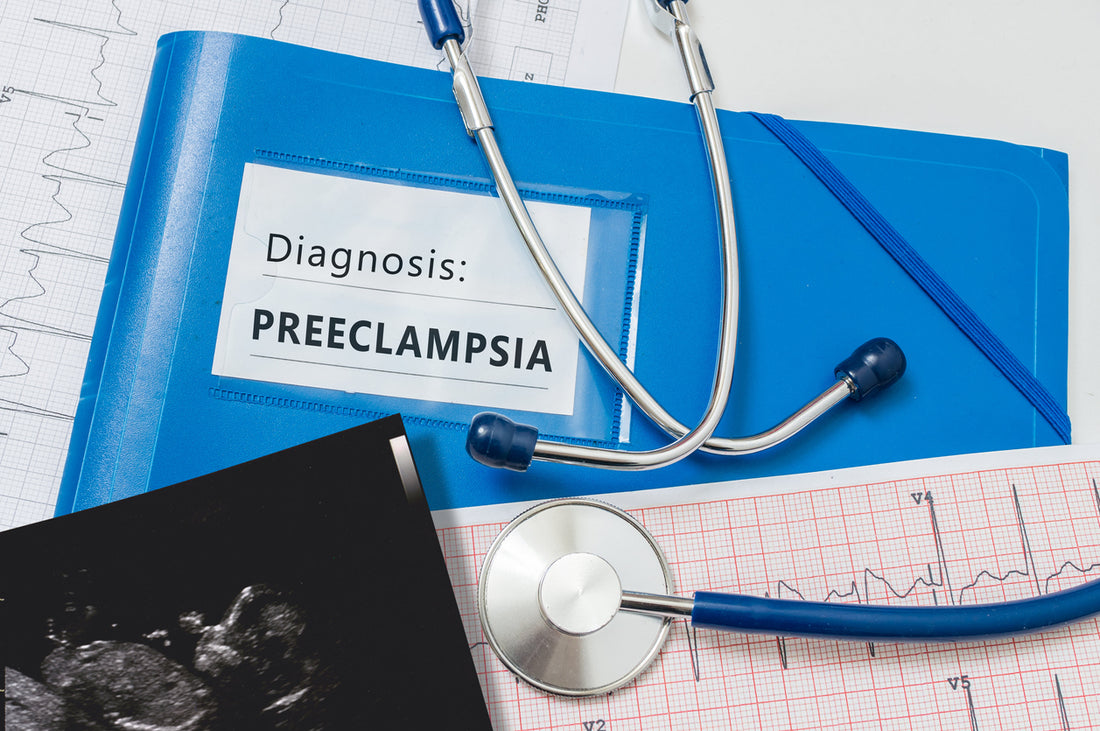Lowering the Risk of Preeclampsia

How can you prevent a condition in which the cause is not specifically known?
Good question.
The truth is that you may not be able to prevent preeclampsia 100%, but research shows that there are numerous ways to lower your risk of developing it.
Preeclampsia should not exist at the level that it does in the US today. This is a scary fact; the United States leads the charts on preeclampsia diagnoses each year by staggering amounts.
Alongside our mortifyingly high maternal and infant death rates that are also at the top of the charts, this should beg for attention. We are obviously doing things wrong.
Preeclampsia is a very serious pregnancy complication for which the only known cure is delivery of the baby. Although some medication can keep the symptoms at bay, waiting too long to deliver can lead to full-blown eclampsia, organ failure, and other complications in the mother and baby. Preeclampsia has mortality risk factors for both mother and baby and all possible prevention methods should be put in place at the first sign of pregnancy.
Our lifestyle and food choices are literally killing us – and our babies. The chemicals and toxins found in our water, on our foods, in our foods, and even in our overly-polluted air are hurting us.
While science hasn’t found the direct link to what is causing preeclampsia, by thoroughly reading through the research on what helps lower the risk, it is safe to say that any inflammation within the body, especially the gut, significantly increases the chances of experiencing preeclampsia.
Inflammation can occur in many ways, as you know. But I am going to focus on how to lessen inflammation and lower the overall risk of developing pre-e.

DIET:
- PROBIOTICS: Probiotics have an anti-inflammatory effect on the body. One study showed that daily consumption of high-quality probiotics throughout pregnancy lowers the risk of preeclampsia by 39%.
- DIETARY FIBER: Increasing dietary fiber has been suggested to prevent pre-e. One study reveals that consuming 24 grams of fiber a day can reduce the risk of developing preeclampsia by 51%.
- POTASSIUM: A diet rich in potassium reduces pre-e risks; however, never supplement potassium on its own as it is dangerous.
- MAGNESIUM: Magnesium-rich foods include leafy green vegetables, nuts, seeds, fish, beans, lentils, and avocadoes. You may also take baths in Epsom salt, which contain Magnesium, or use an external Magnesium spray or rub. (It’s important not to confuse Magnesium Citrate with Magnesium Sulfate. Magnesium Sulfate is often given to women who have developed preeclampsia and although it can be an effective treatment, it has a range of accompanying risk factors and can cause a range of uncomfortable side effects.)
- CALCIUM: Calcium can help lower the risk of preeclampsia. The World Health Organization recommends supplementation of calcium in high-risk women. However, certain forms of calcium can prevent iron absorption, so consult your midwife or doctor before supplementing.
- B VITAMINS: B Vitamins can reduce the risk of preeclampsia as well as relieve other pregnancy symptoms, such as morning sickness.
- VITAMIN D: Sunshine or supplements (Fermented Cod Liver Oil or VitD3 drops) will increase the absorption of Vitamin D in the body. VitD promotes overall health and decreases risks of developing many conditions, including pre-e.
- VITAMIN C AND E: These vitamins play important roles in a healthy pregnancy, including lowering the risk of pre-e.
- FRUITS AND VEGETABLES: Consuming whole-food produce (avoiding canned or syrup-based versions) decreases risks of preeclampsia.
- EAT ORGANIC: Research shows that pesticides are found in and on almost all of our non-organic foods today. These toxins are inflaming our guts and causing chronic illnesses to run rampant. Avoiding processed foods, antibiotic-fed meats (and eggs), food dyes, and non-organic foods will lower the risk of gut inflammation, which in turn, lowers the risk of preeclampsia.
- HEALTHY FATS: ‘Fatty-Foods’ should not scare you. Fat makes up over half of the brain, and we need it to function at our highest potential. However, this is not referencing junk food. Healthy fats are whole foods that are high in natural fat content. Foods such as almonds and avocados.
- SPICES: Tumeric, Ginger, Garlic – all of which has healing and anti-inflammatory properties.
- PROTEIN: According to Dr. Brewer, creator of the Brewer’s Pregnancy Diet, consuming 80 grams or more of high-quality protein every day of pregnancy, eliminates the risk of preeclampsia. Read more about the Brewer Diet here.
- SEAWEED: Seaweed based supplements and foods can lower the risk of pre-e. Spirulina and Chlorella are both highly recommended.
- BEETS: Raw Beet Juice and Beetroot are natural sources of calcium and also balance the sodium/potassium ratio in your blood. It can also aid in lowering high blood pressure.
LIFESTYLE:
- OIL PULLING: Oil pulling lowers the level of bacteria in the mouth. Gum disease and poor dental health are linked to an increased risk of preeclampsia and preterm labor.
- SEX: Semen may help prevent preeclampsia. Oral sex with the father of the baby may lower the risk of developing preeclampsia.
- HYDRATION: Proper water intake keeps the blood pressure down.
- BABY ASPIRIN: Small research studies show that daily baby aspirin reduces the risk of pre-e; however larger studies show no significant benefits. Talk to your midwife or doctor before beginning this protocol.
- EXERCISE: Daily exercise lowers blood pressure and increases the overall health of the body. It also lowers the risk of developing preeclampsia. One study shows that stretching is very beneficial for mothers who have already experienced pre-e in a previous pregnancy.
- WEIGHT LOSS: Women with a high BMI (Body Mass Index) are at a higher risk for developing preeclampsia. Consider losing weight prior to pregnancy or working with your midwife or doctor throughout pregnancy on a nutrition and exercise plan.
From Dr. Brewer: Please be aware that traveling and moving can disrupt your eating routine just enough to trigger a low blood volume problem which can start the rising BP/pre-eclampsia/HELLP/premature labor/IUGR/abruption process. Putting the brakes on that process can be more difficult than preventing it. Sometimes just being aware of this danger is enough to help you to remind yourself to continue providing for your nutritional needs, in spite of any changes and stresses which may be going on in your life.
Resources:







